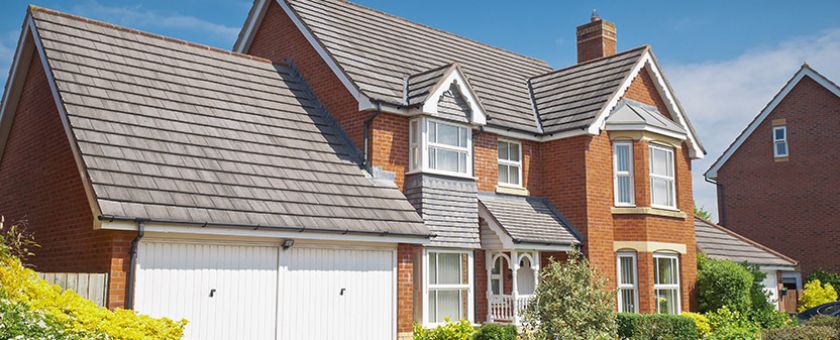Average gas and electricity bill for a 5-bed house

Share this guide:
Last updated: 26 May 2023
Save money on your energy bills
Enter your postcode below to get started
How much electricity does a 5-bed house use?
A 5-bed home can be considered a high consumption household due to the fact it is larger than the vast majority of homes. Using the Typical Domestic Consumption Values (TDCVs) for a high consumption household, on average you would be expected to get through around 4,300 kWh of electricity.
With homes of this size, there are a large number of factors that will affect how much electricity is used. Things like the behaviour of the occupants and energy efficiency of appliances you own will come into play more as there is simply more of you and more of the house that requires power. Making sure you are not leaving your lights and TV on is a good way to get started when trying to reduce electricity usage.
There are many other areas that also affect your energy usage. Check out our guide to see how much energy the average UK home uses and whether you are using too much.
How much gas does a 5-bed house use?
Using the TDCV model again but this time for gas, a 5-bed home will get through around 17,000 kWh. This is of course much higher than smaller properties as it will require much more energy to keep it heated. A 5-bed property is also much more likely to contain two or even three stories which makes it more difficult to keep warm, therefore increasing the gas you get through.
Something else to consider is that larger homes will typically be older and therefore less efficient. You could consider insulation your home, but this won’t be an option for everyone. If you can’t insulate, it’s about being smart with what you have. For example, making sure you don’t have furniture near radiators as it will prevent the room from being properly heated.
The average electricity bill for a 5-bed house
Taking our earlier usage figure of 4,300 kWh and combining this with the typical cost of electricity in the UK (34p per kWh plus daily standing charge of 46p) we can estimate that the electric bill for a 5-bed home would be £1,630 per year, or £136 a month.
This will of course vary and a family of five with children going to bed early is likely to cost less than a unit of five nocturnal students. Regardless of the situation, the steps you can take to stop this cost being higher than it needs to be are relatively straightforward. Washing on a lower heat and then drying on a rack rather than a tumble dryer (if you have one) is a good option, as is controlling the amount of appliances that are plugged in simultaneously.
The average gas bill for a 5-bed house
Gas in the UK currently costs around 10.03p per kWh, while daily standing charges are at around 28p per day. This means a 5-bed home's gas bill will cost around £1,853 a year, or £154.50 a month.
As we discussed previously, larger homes are not only more difficult to heat because of the size of the house but also because they are unlikely to be as efficient in keeping the heat in. If insulating your house isn’t going to be possible then simple steps like making sure that heaters aren’t blasting at all times and are used sparingly will help.
If, like many households, your water is heated via gas rather than electricity; ensuring that you and the other occupants take shorter showers can really make an impact. In larger homes with more residents, these kinds of concessions can result in really noticeable reductions in your monthly bill.
Save money on your energy bills
Enter your postcode below to get started
Is it cheaper to heat your home with gas or electricity?
Looking at government figures, gas is around 80% cheaper than electricity. While it’s true that gas boilers aren’t the most efficient ways of heating your home, the difference in cost between gas and electric makes gas a far more appealing option.
There are some homes however that don’t have access to mains gas and have to use liquified petroleum gas (LPG). For these properties, the cost of using gas can actually become high enough to warrant an electric boiler.
What is the best way to get cheap energy?
A few behavioural changes towards your energy usage around the home can make a huge difference to your annual bills. Additionally, using technology such as smart meters and plug timers are great ways to get extra control of your usage.
The most tried and tested way of reducing your energy bills though is to switch providers. Switching energy providers has never been easier with the actual changeover generally handled entirely by the respective companies, meaning you don’t have to do much at all. The first step is always seeing what’s available to you, which you can do with our handy energy comparison tool.
We are an independent and impartial price comparison website.
Our services are 100% free to use.
usave.co.uk is supported by its users. When you make a purchase through links on our site, we may earn an affiliate commission.
Don't miss these
-
-
How to Pay Your Energy BillsTariffs and Bills
-
-
Read on our blog

With the government poised to implement tough new measures to...

Budget broadband provider TalkTalk has been notifying customers via email...

A year-long investigation by charity Citizens Advice has revealed a...

Education Secretary Nadhim Zahawi has announced a new commitment to...






